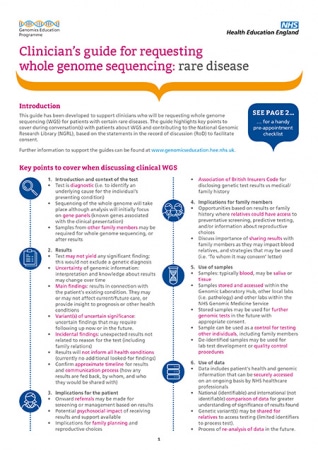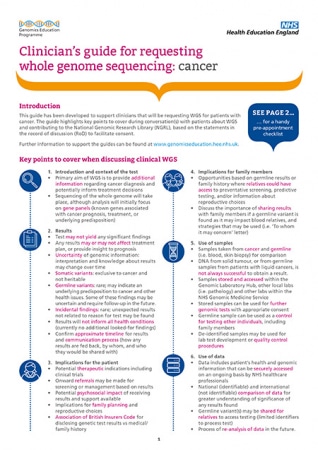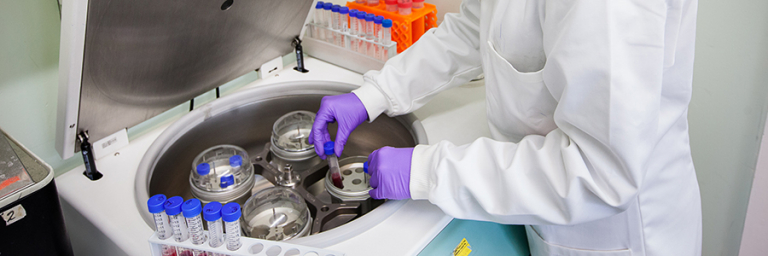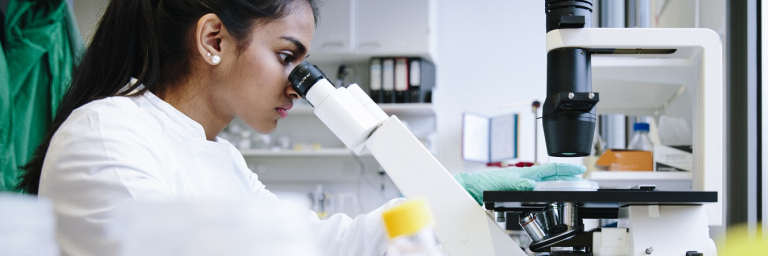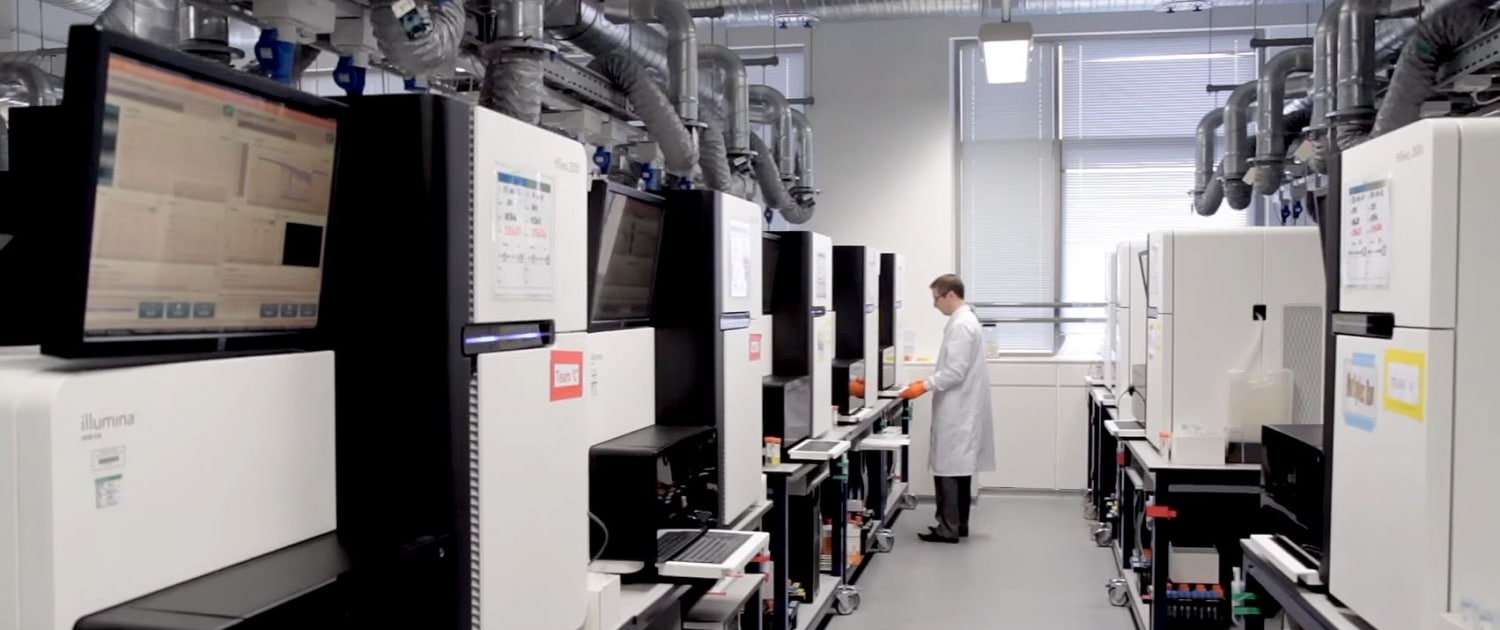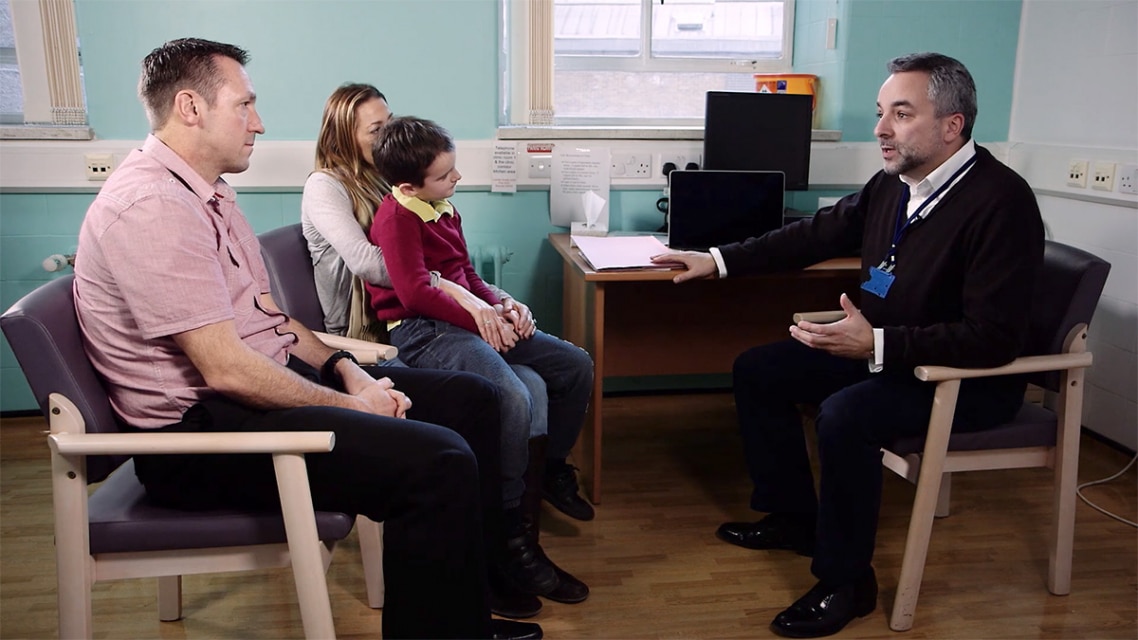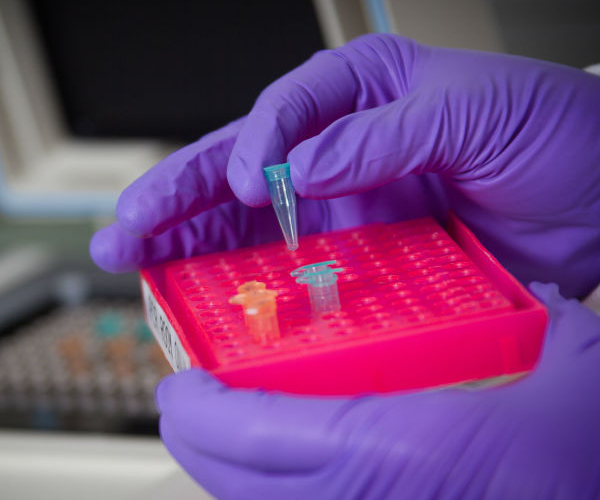Requesting whole genome sequencing
WGS can be requested using standard order forms for patients and family members with rare diseases or cancer. NHSE/I has developed national standard operating procedures and order forms can be accessed through your local Genomic Laboratory Hub (GLH). There may be a more specific process in your region adapted for local needs, so please make sure you check with your GLH.
It is crucial to include information about the patient’s clinical and family history in the order form, as this can affect the accuracy of results. For rare diseases, comprehensive information about the patient’s phenotype using Human Phenotype Ontology (HPO) terms must be provided to enable accurate interpretation of genomic findings. It is similarly important to include accurate information about a patient’s cancer (based on histopathology or previous genetic evaluations).
If incorrect or insufficient clinical information is provided, or if incorrect information is included about the family history, potentially relevant genomic findings may not be identified during analysis of WGS. As well, if insufficient information is available to proceed with WGS, your GLH may contact you to discuss this further, or to suggest if a different type of genetic test may be more appropriate in that particular context. Each region may have their own process, but it is important to ensure that your contact details are clearly indicated on any forms.
If there are any changes to the clinical information or family history that is learned after WGS is requested, or if the patient changes their mind about having WGS, contact your GLH to discuss this further as soon as possible.
WGS indications for rare diseases and cancers
Whole genome sequencing (WGS) is one technology that is being used for diagnostic testing in the NHS. Initially, WGS will only be available for patients with certain rare diseases and cancers. The National Genomic Test Directory specifies which patients may be offered a WGS test; this should be targeted primarily at situations where a genetic diagnosis will affect the healthcare of a patient or their family members.
If you are unsure if WGS is the right test to offer your patient versus other genomic tests, or if you think your patient may have had WGS already, contact your local GLH and/or appropriate clinical team (for example, clinical genetics) to discuss further. It is important to be aware of this prior to discussing genomic testing with your patient so that their expectations regarding results and research opportunities can be managed appropriately.
Recording consent
Each patient’s (and family members’ where relevant) choices are captured via a nationally standardised record of discussion (RoD) form and additional forms where relevant. In order for WGS results to be released to the GLH, an RoD must be received by the GLH for each individual undergoing WGS.
A guide to the forms required for your patient can be found in the table below. The offer to take part in the NGRL should be made to all patients and family members being offered WGS. However, this discussion may take place at a later point after clinical WGS has been initiated, if clinically appropriate.
| Individuals aged 16+ years with capacity | Children (less than 16 years) | Adults without capacity | Individuals who are deceased | |
| Clinical test | RoD reviewed with each individual | RoD reviewed with parent/guardian | RoD reviewed with person acting in best interests of the patient | RoD reviewed with appropriate relative |
| NGRL | The research choice is captured within the RoD. There is an additional ‘Participation in the NGRL’ form to note the individual’s choice if this was not made at the time when the clinical test was discussed. | |||
| No additional forms | OPTIONAL assent form signed by child | MANDATORY form signed by consultee | No additional forms | |
There are some other considerations for recording patient’s choices in exceptional circumstances:
- If the RoD is not submitted at the time when WGS is requested but discussions have taken place with the patient about clinical testing, the clinician can select the ‘Form to follow’ box at the bottom of the WGS order form. An RoD form is required before results can be released.
- Where patient’s choices have been obtained through phone or video consultation, the clinician may sign the RoD and note that the patient has agreed to this remotely. This should be recorded in their notes, and a copy of the form should be sent to the patient for their records.
- It may not be possible for the patient to provide consent, for example where the patient lacks capacity and there is no appropriate representative available to make decisions their behalf. The clinician may decide to proceed with clinical WGS, taking responsibility that it was in patient’s best interests. This should be noted on the RoD form and an appropriate record should be kept locally of the basis of this decision. The decision to take part in the NGRL can be sought at a later point in the patient’s clinical pathway.
The process of capturing individuals’ clinical and research choices may be adapted for local needs, so please make sure you have checked this with your GLH.
If the GLH receives incorrect or incomplete information with regard to the patient’s choice to have WGS, they may contact you to discuss further before they can initiate the test. So it is important to ensure that your contact details are clearly indicated on any forms.
The Patient Choice model
The aim of the Patient Choice model is to enable patients to make an informed decision about having clinical genomic testing in the NHS GMS, as well as make a clear and distinct decision about being part of the NGRL. This model has been developed based on clinical input, practical experience from the 100,000 Genomes Project, as well as patient feedback, in order to support discussions between patients and their clinical teams, and provide standardised ways to record a patient’s choices about genomic testing. Initially, this Patient Choice model will only be relevant for patients and family members undergoing WGS; all other tests should continue to involve consent discussions and documentation as per current clinical care.
Consent for both the clinical and research aspects of WGS may be obtained over one or more discussions, ensuring that there are no ‘surprises’ for the patient regarding what will happen with their samples and data.
Sample requirements
There are a range of factors to consider when taking patient samples for whole genome sequencing.
Rare diseases
Germline DNA for WGS and other genomic tests is typically and ideally obtained by a blood sample, although it may also possible to obtain this from a saliva or tissue sample. Stored DNA may be used if a patient has previously had samples taken for previous genomic tests. For patients who have had a bone marrow transplant, a germline DNA sample would need to be acquired from skin fibroblasts, other unaffected tissue, or from a germline sample stored before the patient’s transplant.
Depending on the possible inheritance pattern of a rare disease in a family, it is also important to include samples from other family members where possible. This can help with filtering through the millions of variants that each individual has in their genome. For example, WGS may be requested to find the underlying cause of a condition in a child where neither parent has any of the same features. This means that variants that have arisen for the first time in the child (known as de novo variants) may be the cause of the condition. Further guidance regarding appropriate samples to submit can be found in the National Genomic Test Directory, or via discussion with your GLH.
If relevant family members were not present in the initial consultation when WGS was offered, consent and samples may need to be arranged separately. This may be done in a separate consultation, face to face or by telephone, depending on the clinical context. The GLH will not send samples for sequencing until samples from all required members of the family (as noted on the WGS order form) have been received.
Cancer
For cancer sequencing, this will involve taking samples from both the cancer (either a tumour, blood or bone marrow sample depending on the type) and the patient’s germline (a blood sample, or tissue sample in the case of haematological malignancies). For patients who have had a bone marrow transplant, a germline DNA sample would need to be acquired from skin fibroblasts, other unaffected tissue, or from a germline sample stored before the patient’s transplant. Specific sample requirements can be discussed with your GLH.
It is important to note that it can be more difficult to extract, sequence and obtain a high-quality result from DNA extracted from cancer cells of a solid tumour, as compared to a germline sample. Therefore, patients should be aware of the potential risk of sample failure and no results being obtained to provide information about their cancer. Conversely, for haematological malignancies (such as leukaemias), it can be more challenging to obtain a high-quality and uncontaminated germline sample.
Results
Genomic variant analysis
Sequencing the genome can be a relatively rapid process (less than a day on occasion); however, the analysis typically takes much longer. The process involves the following steps:
- Sequencing: the DNA in a sample is fragmented and sequenced in short pieces, called ‘reads.’
- Mapping: the millions of reads are then matched to a reference sequence, using software that finds where each read maps to in the genome.
- Variant calling and filtering: bioinformatics tools are used to identify and evaluate the approximately 5 million variants each person has in their genome when compared to the reference sequence.
A tumour specimen will contain the full complement of germline changes, in addition to a variable number of somatic changes. While most of these genetic changes (variants) can be identified by our analysis of the whole genome, the significance of much of this information is not yet known. Most variants do not cause disease and are part of natural variation in the general population. On account of the large number of variants identified, it can be difficult to determine whether variants identified in an individual are related to their condition.
Clinical laboratory scientists, who have expertise in variant interpretation, use a range of tools to filter through the variants in each genome and determine whether any are related to the patient’s condition. Any reportable findings confirmed in an NHS genomic laboratory are sent back to the referring clinician via a standard laboratory report, which includes details of the variants found and the interpretation made.
Rare diseases
For patients with a Mendelian (monogenic) rare disease, variant(s) that are clearly causative of their condition are called pathogenic variants. There are standards and guidelines made by the American College of Medical Genetics and Genomics and the UK’s Association of Clinical Genomic Science to ensure consistency in assessing the evidence for pathogenicity in interpretation of sequence variants.
Cancer
In tumour sequencing, the sequence of the germline sample is subtracted from the sequence of the tumour sample to produce the variants found in the tumour alone; these are called acquired or somatic variants. Somatic variants are not passed on in families so pose no additional risks to family members. A somatic variant that is involved in driving development of the tumour is called a ‘driver mutation’. Other variants arise in the tumour by chance or as a consequence of dysregulation of cellular controls; these are called ‘passenger mutations’. Somatic variants that are used in the clinical management of the patient’s cancer are termed ‘actionable’. Variants can be actionable if they inform likely drug response (‘predictive’), likely drug non-response (‘resistance’), or indicate tumour behaviour or severity of clinical course (‘prognostic’).
Not all driver mutations are actionable. As well, on some occasions, a variant present in the patient’s germline genome may influence management of the tumour and would therefore be considered actionable, as well as potentially having implications for the patient’s relatives.
The American Society of Clinical Oncology, Association for Molecular Pathology and College of American Pathologists have published standards and guidelines by which the evidence for ‘actionability’ of cancer-related variants can be graded, and these are being adapted by the UK Association of Clinical Genetic Scientists.
Types of genomic findings
There are several possible findings that may be fed back when a genomic test is ordered. It is important to note that WGS analysis will only look for findings relevant to the patient’s current clinical presentation. As well, there is a significant likelihood that WGS may not yield any significant findings. Any main findings that are identified include results in connection with the patient’s existing condition, which may or may not affect their current or future care, or provide insight to prognosis or other health conditions.
It is therefore important that the patient, and their family members where relevant, are informed about possible types of findings prior to consenting to have the test, and access appropriate support (via discussion with or referral for genetic counselling) if concerns arise. It should be noted that WGS results often take longer than other medical tests or other genomic tests. Patients should also be provided with clear information regarding how, by whom, and when their results will be fed back to them.
Rare diseases
Genomic germline analysis may also reveal variant(s) of uncertain significance, which are findings where there is currently insufficient information for the laboratory to confirm whether it is part of natural variation or causing disease. Further testing of other family members may be indicated to find out more about whether or not the variant is the cause of the condition in the family. In other cases, it may be that the variant needs to be reviewed in the future if more information becomes available.
If no significant genetic variants are found, this does not rule out the possibility that the patient’s condition has a genetic basis, or that they could develop a condition in the future.
Cancer
For cancer WGS, analysis will likely identify a sizeable number of somatic variants. Some of these variants may be driver mutations that are potentially actionable. Review by the clinical team is therefore essential in order to evaluate any potentially actionable variants in the context of the patient’s tumour type, stage and overall clinical condition. Other mutations found may be driver mutations that are not actionable, passenger mutations or mutations of uncertain clinical significance.
Analysis of the germline sequence in patients with cancer may identify a pathogenic variant in a cancer susceptibility gene. These may be found in around 3% of cancers, although this varies by individual tumour type. These pathogenic variants can be actionable with regard to management of that patient’s tumour by informing on drug sensitivity and/or prognosis. This information may also have implications for the patient’s future risk of cancer, and for their relatives, so discussion with or referral to clinical genetics is advised. In addition, analysis of the germline sequence may identify variants that indicate efficacy/sensitivity to chemotherapeutics; these are called pharmacogenomic variants.
Incidental findings
Unexpected germline results that are not related to the reason why the patient is having that genomic test are known as incidental findings. For example, this may include identifying a variant that involves a predisposition to cancer when the reason for requesting the test was to identify the cause of a child’s developmental delay. If multiple family members are being tested, this may include information such as misattributed parentage (so when the reported father or mother is not the biological parent). Misattributed parentage can be identified by any genomic test where individual and parental samples are tested and analysed simultaneously.
Genomic sequencing does have the potential to look for findings related to other conditions, including ones that may be medically actionable or related to a person’s carrier status; in the 100,000 Genomes Project, these were referred to as ‘additional looked-for findings’. None of these findings will be looked for initially in the NHS GMS; this is being evaluated as part of the results from the 100,000 Genomes Project prior to considering implementation in the NHS in the future.
Implications for the patient and family
It is important that healthcare professionals elicit and explore the patient’s expectations surrounding WGS, as well as ensure that all family members present are included in discussions to facilitate informed decision-making. Important issues to address include how patients may react and adapt to possible results, how results may or may not affect treatment decisions, and acknowledging the uncertainties inherent to WGS. In addition, there are a number of factors that can influence an individual’s choice to have a genomic test, including their wider physical and mental health history; cultural, religious, familial and personal values; the impact of the disease on the individual or family; and the timing of the consent conversation, for example if the patient has just received a clinical diagnosis or is in the midst of other procedures or treatment.
Further resources and information that can be useful for patient are listed in the Further information section below.
Family planning and reproductive choices
If a diagnosis for an individual’s rare disease or inherited predisposition to cancer is found through WGS, the patient and their relatives may have access to family planning options. Pre-implantation genetic diagnosis (PGD) uses in-vitro fertilization procedures and tests available embryos for the condition in the family prior to implantation. Prenatal testing can include chorionic villus sampling, amniocentesis or non-invasive prenatal diagnosis to determine if a pregnancy has inherited the variant(s) causing the condition in the family. Importantly, patients may not wish to pursue any testing, but all should be offered a referral for genetic counselling to further discuss their options.
Sharing results with relatives
If a pathogenic variant is found to cause a patient’s rare disease or predisposition to cancer, certain blood relatives such as parents, siblings or children can inherit the same variant and develop, or have an increased risk to develop, the same condition. It is therefore important to have a discussion with patients, both prior to and following testing, regarding the importance of discussing their results with relatives. This can enable relatives to access preventative screening, genetic counselling, predictive genetic testing and information about reproductive choices.
Resources such as a ‘To whom it may concern’ letter outlining the condition and variant can be helpful to assist with the communication process of family members learning about their risk and accessing a referral for testing. As receiving a ‘To whom it may concern letter’ can cause distress, patients should be encouraged to accompany such a letter with a personalized cover note or to have a conversation with their relatives in addition to sharing this letter. Further support (such as genetic counselling) can be sought prior to testing if concerns arise regarding facilitating communication with family members.
Association of British Insurers’ code on genetic testing and insurance
Many patients, particularly adults, have questions regarding insurance-related matters, including how having a genetic test can impact their mortgage or life insurance.
The code for genetic testing is a voluntary agreement between the government and the insurance industry via the Association of British Insurers (ABI). The purpose of the code is to protect individuals from discrimination by insurance companies based on results from a genomic test.
All members of the ABI that provide life, critical illness or income protection insurance have signed up to the code. This means that they have agreed to never require or pressure an applicant to have a predictive or diagnostic genetic test, under any circumstances.
Predictive genetic testing (sometimes referred to as cascade or pre-symptomatic testing), is a genetic test that can be offered to individuals not currently presenting with any signs of the condition and determine whether they will or are likely to develop that condition in the future. Members will also not ask for, or take into account the result of, a predictive genetic test (with the exception of a predictive result for Huntington disease when an individual is applying for life insurance over £500,000). An applicant can choose to disclose the result of a ‘favourable’ predictive genetic test result to an insurer.
The code distinguishes predictive tests from diagnostic tests, which are still required to be disclosed, as is the same with other non-genomic diagnostic tests. It is also important to note that individuals can still be asked to provide information about their medical and family history when completing an assessment. The code has no end date, but will be reviewed every three years to ensure that it can incorporate any changes to genomic testing.
For more information, see the code on genetic testing and insurance and the ABI’s FAQs.
Use of samples
Sample processing for WGS
DNA is extracted when samples arrive at a GLH. Standard laboratory checks will be done to ensure quality of the samples. The laboratory will await samples from all family members for whom WGS is being requested prior to sending them for sequencing.
You may be contacted by your GLH if there are any issues with samples when they arrive at the laboratory, or if potential errors are identified at the time of sequencing or analysis.
Sample storage
DNA samples are stored in your region’s GLH, and can be accessed by other laboratories within the GMS. Tumour samples may also be stored in your local hospital histopathology unit. Stored samples can be used in the future for further genomic tests after taking appropriate consent from the patient, or as a control sample when testing family members of that patient. Stored samples can also be used to help with lab test development and quality control procedures, although they are de-identified for this use. The laboratory will notify the clinician if there is a limited remaining amount of sample (for instance, if an individual is deceased) so a decision can be made on how it can be used.
Use of data
Patient data in the NHS Genomic Medicine Service
Patient data will be held in a national database within the GMS that will enable healthcare professionals and laboratory scientists to identify patients with similar conditions or genomic variants. This includes data:
- about the sample provided by the patient (such as blood, tissue and/or saliva), including information to track the sample location and testing process;
- from the analysis of that sample, including the raw data from genomic tests, the variants found and the result of interpretation of these variants; and
- about the patient’s clinical condition, including diagnoses, HPO terms and information about treatment and management.
Information within the patient’s record can be updated throughout the testing process when subsequent tests are requested, when there are changes to the analysis of genomic results, or when new information is provided about the patient’s condition.
Data sharing for diagnosis and testing family members
Sharing and comparing patient data allows for a greater understanding of the relevance of particular genetic variants, and is integral to driving forward genomic medicine. Patient data can be shared among healthcare professionals and laboratory scientists nationally or internationally in order to compare the findings from patients with similar symptoms or variants, which can help to determine which variants may or may not be linked to a particular condition. When this is done, patient identifiers (name, date of birth, address) are removed.
In addition, the record of discussion form outlines that a patient’s genomic results may be shared so that family members can access testing for the particular variant found in that family. The patient would therefore not be contacted each time a test is requested for another family member. This can be done without sharing specific information about that individual, including their identifiers or medical history. As mentioned above, genetic counselling can be sought prior to testing if concerns arise regarding facilitating communication with family members.
It is important to note that if a patient chooses to have WGS, their clinical, sample and genomic sequencing data can be accessed in this way. This is separate to the patient’s decision to allow their samples and data to be accessed as part of the NGRL, which is a distinct choice that patients can choose whether or not to opt in.
Data security
The national database holding patient records is secure and confidential, and the data is held on IT systems that meet the NHS legal standards for security.
Data for each patient can only be accessed by NHS staff with approved access, including healthcare professionals involved in the patient’s care (either directly or indirectly such as part of multi-disciplinary team meetings) as well as staff within genomic laboratories that are processing, analysing and reporting the genomic data. A record is kept of staff that access a patient’s record.
Additional points to consider
There are additional factors to consider when discussions about genomic testing take place with children, individuals without capacity, or regarding individuals who are deceased. Different forms of guidance are available for these situations, and you may also wish to discuss further with the appropriate clinical team, such as your local clinical genetics service.
When can a child provide their own consent to a genomic test?
In UK law, individuals who have capacity and are aged 18 and older have full autonomy to make decisions about their own medical care and participation in research. Individuals aged 16 and 17 may also make decisions independently of their parents or legal guardian, although this can be overridden in some circumstances. Gillick competence refers to an assessment of whether a child under age 16 is able to consent to decisions about their own medical care.
Therefore, young people aged 16 and older with capacity, or those under 16 deemed to have Gillick competence, can consent to whole genome sequencing and the NGRL, completing their own record of discussion form. Individuals under age 16 who are not deemed to have Gillick competence would be required to have a parent or legal guardian consent to WGS on their behalf.
It is vital that the healthcare professional(s) involved make a careful assessment of the individual’s capacity to make the choice about having a genomic test, with details recorded in the patient’s medical record. If a child is not deemed competent to consent, they may still be able to provide assent, and therefore effort should be made by healthcare professional(s) to involve children in decisions about their medical care as much as possible, including in face-to-face conversations and via written and/or visual materials.
Genomics England has produced an assent form that is available for use with children when discussing the NGRL.
For more information:
- General Medical Council’s 0-18 years, Assessing the capacity to consent
- Care Quality Commission’s Brief guide to capacity and competence to consent in under 18s
- Joint Committee on Genomics in Medicine’s Consent and Confidentiality in Genomic Medicine 2019 report
How is consent obtained for adults who lack capacity?
As with consent for other medical tests and treatments, capacity should be assessed based on the patient’s ability to make each decision at the time it needs to be made. Individuals should be helped to make their own decisions as much as possible, or to provide assent if they cannot consent.
Where possible, clinical genomic testing should involve discussion with an individual representing the patient’s interests (such as someone who knows them and could make decisions on their behalf). For research decisions involving individuals aged 16 or older who are deemed to lack capacity, including in situations owing to a health emergency for the patient, a consultee (such as a family member, friend, or court appointee who can advocate for the person’s wishes or feelings) must be nominated to decide on their behalf. If an individual later re-gains capacity, they should be involved at the earliest opportunity in the discussion about their choice to have a genomic test and participate in research.
Genomics England has produced a consultee declaration form that is available for use in cases where an adult lacks capacity and is mandatory for research participation in the NGRL. It can also be used for the clinical choice about WGS, but it is sufficient to record details of the patient representative and their advice in local notes.
For more information:
How do I obtain consent to test a sample from an individual who is deceased?
Genomic tests can be requested on individuals who are deceased, including adults, children and fetuses with appropriate consent. This can provide information that may be helpful to family members, including the reason why their relative passed away, if there are other relatives who may be at risk of the same condition in the future, or if there are reproductive options available. Testing would require the availability of a stored DNA sample, or tissue sample from which DNA can be extracted, and pass appropriate quality control tests to be useable for that genomic test.
Consent to analyse DNA from a deceased individual should be sought typically from a relative, spouse or partner. The Human Tissue Authority (HTA) has guidelines regarding qualifying consent, or whose consent would be required to analyse DNA extracted from tissue in certain situations. For a fetus less than 24 weeks of gestation, consent to test DNA is covered as part of the consent provided from the mother.
For more information:
- Joint Committee on Genomics in Medicine’s Consent and Confidentiality in Genomic Medicine 2019 report
- Human Tissue Authority guidance on consent and DNA
Further information
Resources to support patients
- NHS England: patient information on whole genome sequencing
- Genomics England: information for patients considering participating in the NGRL
- Genetic Alliance UK: national charity for patients and families affected by genetic conditions
- SWAN UK: supporting families affected by a syndrome without a name
- Unique: understanding rare chromosome and gene disorders
- Macmillan Cancer Support
- Medline Plus Genetics: patient and public-friendly information about genetics and health conditions from the US National Library of Medicine
Information for clinicians
- NHSE National Genomic Test Directories
- GeneReviews: an international clinician resource providing information about inherited conditions
- Joint Committee on Genomics in Medicine’s Consent and Confidentiality in Genomic Medicine 2019 report


